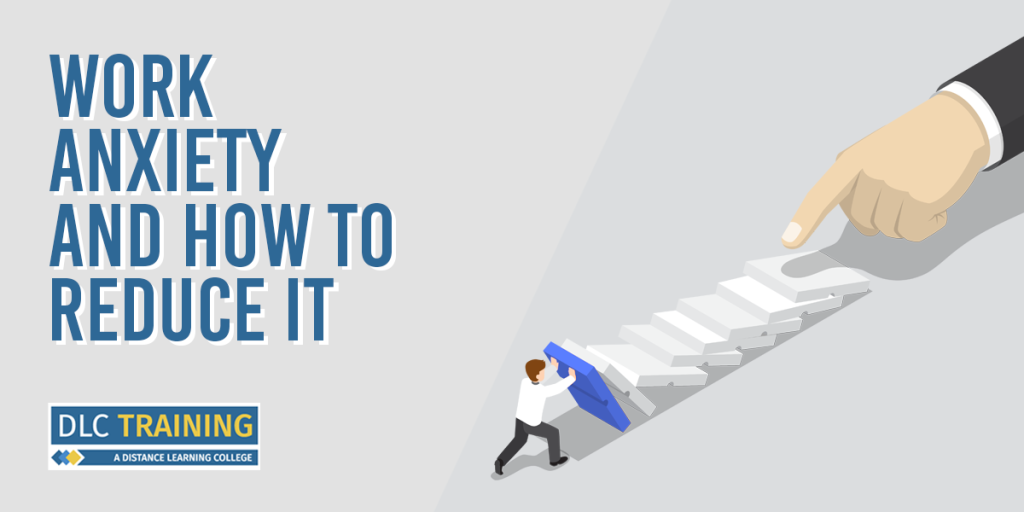Are you experiencing nausea or distress when you think about attending work, deadlines or certain aspects of your career? Then there’s a good chance you may be experiencing work anxiety.
Often starting small, work anxiety can become quite debilitating and can have a huge impact not only on your work performance but on your life overall. That’s why it’s important to recognise the early signs and put strategies in place to ensure you’re getting the most enjoyment out of work.

What is work anxiety?
Workplace anxiety, or work-related stress, is when the excessive amount of stress and pressure that is put on someone due to their work starts to impact their mental health and well-being. It is often caused by deadlines, KPI pressures, overworking, workplace bullying and even the culture of the workplace. But, there are many things that could cause work anxiety.
Symptoms of work anxiety
From small signs to the more obvious ones, there are a range of symptoms that can show up due to work anxiety and some people may only experience a handful – making it really difficult to spot at times!
Emotional Signs of Work Anxiety
According to the NHS, some of the more common signs of work-related anxiety emotionally include:
- Withdrawal from the social aspect of work
- Loss of motivation for day-to-day tasks
- Feeling more tearful or aggressive while working
- Minor problems experienced at work may feel much bigger
- Often predicting the worst-case scenario such as expecting to be fired all the time
- Always feeling negative towards work
Individuals may begin to avoid tasks, seem to be overworking way more than usual and may not participate as much in the work conversations.
Physical Symptoms of Work Anxiety
Physical symptoms of anxiety can be a bit easier to spot, although not all the time! According to Bupa, these can include:
- Fatigue or extreme tiredness
- Indigestion
- Stomach issues
- Nausea
- Headaches
- Weight gain/loss
These are just some of the physical symptoms anxiety can cause and some may get more than one, while others may not get any physical symptoms. This is why it’s important to monitor changes in those around you and yourself for better care.
What is imposter syndrome?
Imposter syndrome is something that most people experience that can add to their work anxiety. The British Medical Association defines imposter syndrome as chronic self-doubt or the feeling of inadequacy that continues to persist despite frequent success. This means, that despite all the actual signs that someone is good at their job and delivers results, mentally this person feels they’re not good enough and that it must all be a fluke or a case of being lucky.
Coping strategies for work anxiety
While those suffering from severe levels of work anxiety should seek help and support from professionals, there are some ways that you can help alleviate early signs or to avoid work anxiety as much as possible.
Make A Plan
Work in the way that works best for you; write a to-do list, keep track of your diary, work digitally and plan out your deadlines into manageable chunks that feel less overwhelming. Keeping track of everything you have to do somewhere other than your brain will free up some mental space and help you visualise your to-do list in a more realistic way.
Don’t Overextend Yourself
Stop saying yes to everything. Overextending yourself and taking on more than you can handle sets you up for failure and more anxiety. Instead, start saying things like, “I’d love to help but I don’t have the capacity for that right now” or “That sounds interesting, unfortunately, I’ve got too much on currently.” These are polite, professional ways to start saying ‘no’ and to help you be more realistic with what you can do in a work day.
Understand What Healthy Work Stress Is
There are times when everyone will feel some type of stress in their work life as this is often the nature of being held accountable for particular aspects of a job. However, it’s important to differentiate between a healthy level of work stress and when this becomes work anxiety. Normal levels of stress should be task-based i.e. this deadline needs to be met and you should feel relief when this happens. If instead, you’re experiencing anxiety about simply attending work, speaking to colleagues or continuous levels of stress then this is not healthy and you should consider seeking further support from managers or the company.
Seek Support
Finally, you’re not in it alone! Seek support from those around you, this could be colleagues, managers, friends, family members, the company’s HR department or even your GP. While work does take up a lot of our lives time-wise, it shouldn’t be taking up too much of your mental wellbeing and it’s important you seek relevant help when needed.
Getting support at work for work anxiety
Many workplaces now have policies in place to protect their employees’ mental health. These can be assistance programs, free advice or more. We’d advise you reach out to your manager or the HR department who can signpost you to the right help and get you back to loving your job! If work anxiety is a permanent aspect of your career, it may be that you simply aren’t enjoying the industry or the role. Learn more about how to find a job you love with DLC Training.